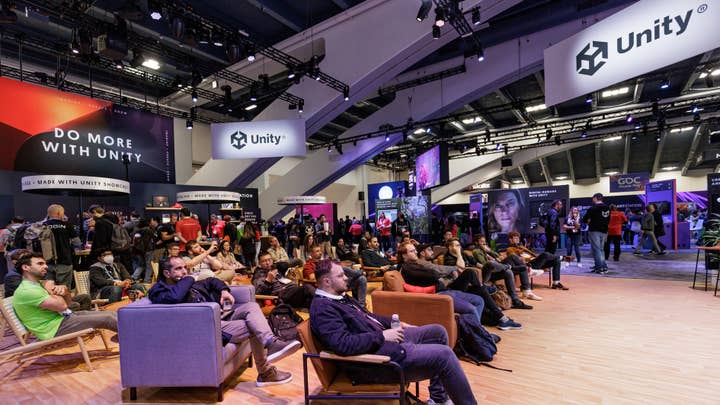Devs on Unity Runtime Fee: "The trust is gone forever"
As the industry awaits Unity's revised plan for install fees, developers question whether they will ever trust the engine provider again
Sign up for the GI Daily here to get the biggest news straight to your inbox
It's been almost a full week since Unity announced its controversial Runtime Fee, and the developer backlash continues.
Studios around the world have expressed concerns that the new fee – charging them every time their game is installed after January 1, 2024, providing they meet certain thresholds – threatens to jeopardise the health, or even existence, of their business. And despite subsequent statements from Unity, it's still not entirely apparent how badly these businesses will be affected.
"The most ridiculous part of this fiasco is that the full effects of Unity's decision on the business aren't even clear," says Ustwo Games chief creative officer Danny Gray. "We're left astounded that an operation of that size can move forward with such ill-thought-out plans and are now scrambling to make amendments."
The Monument Valley studio has been predominantly making games for subscription services in recent years, including Apple Arcade and Netflix. At first, it was assumed the developer would have to pay install fees on games for subscription platforms, but Unity has since claimed it will charge the distributor instead – a charge Gray is highly doubtful Apple or Netflix will pay.
"Even if they backtrack this time, who's to say they won't do something like this again in the future?"
Tamara Alliot, Nerial
"Worse than that, those platforms perhaps won't be signing any Unity-based games if [Unity insists], resulting in developers turning away from the engine altogether," he says. "If you want an example of how crazy this is, anecdotally some developers who've been paid already for their subscription titles are now hoping nobody plays their game. It's literally and figuratively flipped the industry on its head."
Lucas Pope, the developer behind the acclaimed Papers, Please and Return of the Obra Dinn (the latter made in Unity), adds that the "jumbled information" Unity has released so far makes it hard to calculate the impact on his own business – and even clarity on this might not soften the blow.
"The extra accounting requirements will definitely give us trouble," he says. "One of the main reasons I originally chose Unity was because of its simple and predictable subscription costs."
Unity has since posted an apology "for the confusion and angst" caused by the announcement, and promised to make changes to the policy based on the feedback it has been receiving. The details are expected in "a couple of days" but developers are still, understandably, frustrated.
"They should have had answers to all of the questions raised by devs before the announcement," says Tamara Alliot, CEO of Reigns developer Nerial. "The details should have been considered and thought through way before a Twitter storm."
Goran Saric, co-founder of Far: Lone Sails developer Okomotive, adds: "It's weird how they think we didn't understand the changes and sum it up as a possible 'confusion.' It is just grotesque and so damn bold that Unity changed the Terms of Service that way, that developers have to pay per install for games that got released already years ago."
Pope posits that each clarification Unity released after the initial announcement "seems to make it sound worse," adding: "The idea that they're tracking installs in some secret but fair way is a good laugh. The sense I get is that this has the potential to become a huge headache of contesting Unity's thin-air charges every month. And if they really do have perfectly accurate install stats then that means they're phoning-home with user information in a way that violates our company's privacy policy, without our knowledge."
Two trade bodies, the European Game Developer Federation and UK's TIGA, have today called out for the European Commission and the Competition and Markets Authority respectively to look further into non-negotiable B2B contracts and the impact changes like this can have on competition in the market. And some developers are certainly keen to make the rules of what companies like Unity can and can't change significantly clearer.
"We shouldn't introduce new agreements that impact tons of the market with little clarity," says Gray. "This clearly will have a huge effect on indie developers and experimental games, ultimately leading to less ambitious games being made, especially shorter games like ours, while having lesser to no impact on bigger or more profit driven studios."

While developers are outraged over the impact on their own businesses, some do understand what has necessitated Unity to make such a dramatic change. As Harry Holmwood, CEO of startup Magicave, notes, Unity is a market leader and the engine behind the vast majority of mobile games – yet it has never turned a profit, so it's clear the management is looking for a way to improve the financial stability of the company.
"If you look at the amount of programmer hours that went into that game from us vs them – Unity has probably done more work on our game than we have because they've got thousands of engineers – you can see their thinking of 'well, hang on, everyone's making money from us except us,'" he says.
"I think all this 'corporate greed' angle maybe isn't quite right because you can argue people are monetising the Unity business in a way that you shouldn't in a loss-making company, in my opinion. But they clearly need to make a profit, we're no longer in that zero interest rate world where money is free and they can raise an infinite amount of it. So I don't begrudge Unity trying to make a profit.
"On the other hand, it feels like we pay quite a lot of money for our Unity Pro licences, which we signed up to on the basis that there's no backend fee, so for them to suddenly say, 'Actually, now there is' – well, are they going to give us back all the money we've paid so far or refund our development expenditure? It feels like they have to roll back on it substantially."
He adds that this is a danger whenever companies become reliant on another firm's technology or platform, pointing to how Apple's IDFA changes have shaken up mobile operations.
"People have built very successful businesses, and then the rules change and you can't do those things any more," he says. "If you've got 200 people making a game on a certain engine and then all of a sudden the business model changes, you're pretty cross about that. I'm sure there are a lot of companies with a lot of lawyers looking at whether Unity can actually do this."
"[Unity should] just go back to the previous pricing model, and officially announce TOS that won't just change like that. Once a game is released with a certain license, the TOS of that time [should] be in effect forever."
Goran Saric, Okomotive
One lawyer – Harbottle & Lewis partner Kostya Lobov – reached out to GamesIndustry.biz with his take on the situation, observing that this situation could change how developers and publishers alike view the terms of service agreements for game engines and other technology.
“Whilst this change will undoubtedly disproportionately impact indies who can least afford it, at a macro level, it should not come as a surprise," he says. "Platform charging models which seem incredibly good value usually don't stay that way forever; things start to shift when the platform achieves a certain user base or the economic landscape takes a turn.

“The reality is that most people don't read the full terms of the engines/tools which they use, or at least not the boilerplate provisions which often specify that a platform/service provider can unilaterally change the charging model (as long as it gives notice). Given how ubiquitous Unity is, this feels like it could be a watershed moment which changes that.
"It also means that publishers will now pay much closer attention to the part of the studio's pitch which talks about which engine they are using, as they will need to factor in the potential costs. Publishers and studios would do well to familiarise themselves with the terms of other engines and tool providers they use, to understand whether a similar change could also happen there.”
Regardless of how Unity presents its revised plans later this week, or communicates similar changes in future, one thing seems to be potentially irreparable: developers' faith in and respect for Unity.
When asked what the engine firm could do to restore that trust, Alliot says; "Not much really. Even if they backtrack this time, who's to say they won't do something like this again in the future?"
She explains that Nerial is compelled to continue using Unity for its current productions, but is "seriously looking into changing engines for some early stage projects." Similarly, Gray tells us Ustwo has two titles that are "too far down the line" to change engines, but the studio has already switched its prototyping team from coming up with new concepts to investigating alternative engines.
"Even if everything was reverted now, the trust is lost and it will be difficult for Unity to regain the faith of developers, particularly considering changes to Terms of Service," he says. "Communication is important. Hopefully this is an opportunity to begin closer dialogue between everyone involved in making games, across all studio sizes, to find a solution and a way forward that works for everyone."

Magicave is still working with Unity on its debut title, but Holmwood says the trust loss "is substantial" and the studio would "have to seriously reconsider" whether it wanted to use Unity for future projects. Pope, meanwhile, doesn't have a Unity game in production and "will avoid using Unity for any future projects."
"The trust is flat gone forever but I wouldn't mind if they ditched this whole plan and tried again for something more sensible."
Finally, Saric says Okomotive is considering an engine change for all future projects, but emphasises the cost would be significant – if only because all the studio's own technology is built on Unity and the studio's team is predominantly experienced in that engine.
"The evaluation for a new engine really needs to be well done, because we don't want to fall into the same trap again," he explains. "It will also be hard to find an engine where we can go really low-level – especially the rendering – but don't have to build everything from scratch. Unreal isn't ideal, because we are not targeting realistic lighting and to change the default look is not easy. Godot is just lacking features [we need] and the entire porting aspect is still in progress.
"[Unity should] just go back to the previous pricing model, and officially announce TOS that won't just change like that. Once a game is released with a certain license, the TOS of that time [should] be in effect forever."
Sign up for the GI Daily here to get the biggest news straight to your inbox

